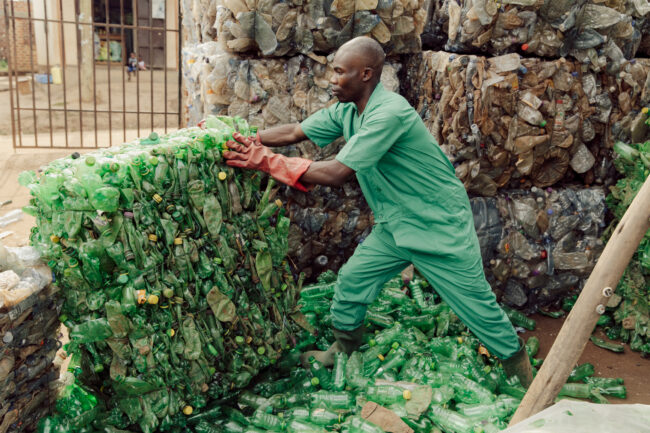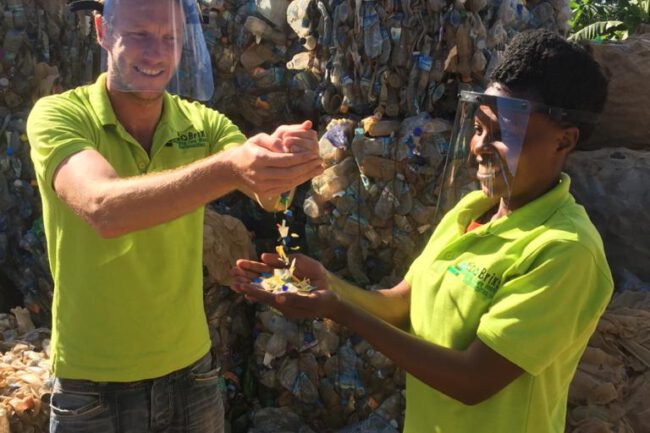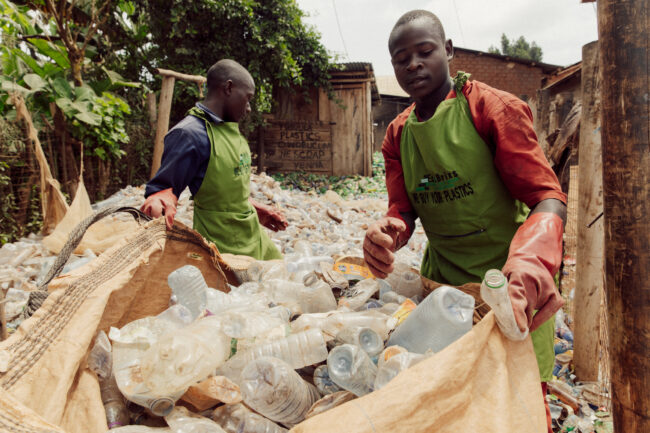Eco Brixs runs a plastic collection network across an 85km radius with a plastic recycling operation that sells PET flakes to longstanding contracts. TakaTaka Solutions is based in Nairobi, Kenya, as the country’s largest waste management and recycling company. Together, our consortium will create synergies in the plastic waste recycling sector by collecting and processing complementary plastic fractions. Our project will create sustainable income opportunities for both rural and urban waste pickers. As a recipient of the 2024 exclusive top-up call, Ecobrix will be able to run their production line at the new production capacity of 2,040 tons of plastic recycled annually, maximising revenue and youth job creation.
The Problem
Uganda produces over 600 tons of plastic waste per day, and less than 10% of it is actually recycled. Waste management in Uganda follows a linear economic approach. This spoils the job creation potential of the circular economy as barely half of the organic waste is collected for disposal, let alone recycled or composted. Meanwhile, plastic waste pollutes the water and soil with macro-and microplastics, causing health and environmental problems.
Waste management and recycling are not handled by the government alone. The private sector is very fragmented, with 100+ collection companies collecting waste from thousands of households and businesses. Of the 40% that is formally collected, most is dumped at dumpsites. Those who are too poor to afford waste collection services simply burn their trash or dump it informally around their community while local recycling companies only work with the most valuable waste (e.g., very clean plastics and cardboard). Recycling in Uganda is focused on Kampala where processing plants export flakes, targeted by informal collectors across the city, these plants compete over volumes. The current model, therefore, requires collectors outside of Kampala to transport unprocessed PET, HDPE, and PP waste hundreds of kilometers into the capital. This discourages rural collection due to high logistics costs.
The Solution
Through our combined efforts, Eco Brixs and TakaTaka Solutions will mitigate Uganda’s plastic problem while also creating new waste working jobs and improving existing waste working jobs.
We can jointly expand our collection capabilities by collecting one another’s preferred fractions, allowing us to create synergies, collect more plastic, and thus create more jobs than either could if operating independently in Uganda.
TakaTaka Solutions creates new jobs by buying plastics that were previously unrecyclable in Kenya, while Eco Brixs creates jobs by collecting recyclable plastics in rural areas where it is not otherwise collected. On top of that, we improve jobs by paying higher prices for plastics than any incumbent collectors and providing social benefits to waste pickers.
We employ young people with low levels of education across our operations, as waste management doesn’t require highly qualified staff and we make a concerted effort to prioritise hiring and promoting women. All of our waste pickers are youth, with approximately 50% of them being women. Overall, our impact will be to change the waste value chain to maximise recycling, leading to green jobs and improved livelihoods for women and youth in Uganda.
Additionality
We would benefit from support from CFYE in conducting more detailed impact studies to understand the “life cycle” of the typical TakaTaka/Eco Brixs employee, or waste worker who sells materials to us. Likewise, we could use the expertise of gender and youth experts to ensure that our hiring/employment practices are friendly to youth and women, as well as to help us create active feedback mechanisms to ensure their voices and concerns are heard. We have not yet had the resources to engage these kinds of experts ourselves, and we would use part of the funding or technical assistance support from CFYE to do this.



